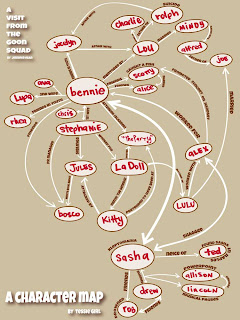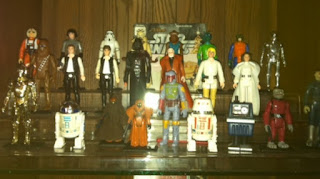Attack The Book
Right at the moment the characters of the movie
‘Cloverfield’ enter an electronics store that is being looted, I knew I was
watching the wrong movie. The movie I
wanted to watch was about these kids, robbing stereos and TV’s as a gigantic
monster tears down New York City.
Instead, we follow a group of young twentysomethings who are in the
midst or on the verge of prosperous lives; their largest concerns are romantic
(‘Does she love me?’). The movie was
a good time, and mostly exciting, but we had seen this before.
‘Attack The Block’ is a British movie that follows a group
of teenage boys up to no good on what appears to be Guy Fawkes Day. They live in a government housing project
(‘The Block’) in south London and open the movie by mugging a nurse that lives
in their building. The mugging goes
weird when a tiny monkey-like alien drops out of the sky and demolishes a car. One of the boys, Moses, kills the creature
after it scars him. Things take a turn
for the worse when more alien monkeys show up and focus their alien invasion it
seems entirely on The Block (just why is a spoiler).
This is the best movie I’ve seen all year. And it's a great example for fiction writers.
This isn't really a movie review - just go watch it - but an opportunity to carry on this conversation about imagination in fiction. This film represents a wonderful display of imagination from the writer-director Joe Cornish, who one must assume from his bio on Wikipedia did not grow up a minority in governement housing in south London. The movie gives an illuminating window into lower-class minority
youth in England - the slang and diction are particularly interesting - 'Trust!' - and at the same time also tells a pretty good story,
reminiscent of any number of 80’s horror/sci-fi/comedy movies – ‘Gremlins,’
for example. It recalls best ‘The
People Under The Stairs,’ which is the only movie in that genre I can think of
that focuses on minority characters, or lower-class characters in general.
Disaster movies tend to focus on the people
that have ‘the most to lose;’ too often they ignore the people that would be
the most impacted by these exotic disasters.
What means would a family living in a housing project like this have to
escape an alien invasion or other disaster – one thinks of Katrina – and what
resources would they be able to utilize to try and save their own lives?
‘Attack The Block’ isn’t an issue movie. The inequity of the situation is made plain
through dramatizing it. A writer of fiction has to have the same approach. The issue, the theme, the squalor and inequities we seek to spotlight and in doing so evaporate, these will be self-evident if imagine successfully. If we fail to, we either never arrive at these stories at all, or do so inadequately.
One of the reasons this is so interesting to me is that the novel-in-progress features a main character who is a minority, and lives in a poverty-stricken neighborhood of her city. Her city happens to be on a planet that isn't ours, but the stresses and tensions are the same. The miseries. Can I present a world without making a martyr of it? Can I let this world and its inequities speak for itself? Can I give this novel its voice - the voice of my main character? I am hopeful and dubious at the same time.
Really this is a rally for myself and for you to be as daring - as fearlessly imaginative - as this film. And attack the book - it's Nanowrimo, after all.




Comments